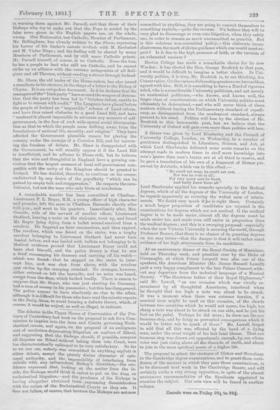The debates in the Upper House of Convocation of the
Pro- vince of Canterbury last week on the proposal to ask for a Com- mission to inquire into the laws and Courts governing Eccle- siastical causes, and again, on the proposal of an ambiguous eort of resolution deprecating litigation on matters of Ritual, and suggesting that the Bishops should, if possible, compose all disputes on Ritual without taking them into Court, were too characteristically episcopal to be very satisfactory. So far as we can see, nobody was committed to anything explicit in either debate, except the plainly divine character of epis- copal authority, and the impossibility of interfering from outside with any independent Bishop's discretion,—the con- fidence expressed that, looking at the matter from the in- side, the Bishops would think it safest to put on the drag on ecclesiastical litigation ,—and the prudence of the Bishops in having altogether abstained from expressing dissatisfaction with the action of the Ecclesiastical Courts as they are. It does not follow, of course, that because the Bishops are not now committed to anything, they are going to commit themselves to something explicit,—quite the reverse. We believe they will be very glad to discourage or even veto litigation, when they safely can, in order to remain as much uncommitted as possible. But is this sedulous non-committal 'policy,—this elaborate incon- elusiveness, the mark of divine guidance which one would most ex- pect P Is it duo to the high pressure of faith, or the vacuum of an exhausted receiver P


































 Previous page
Previous page